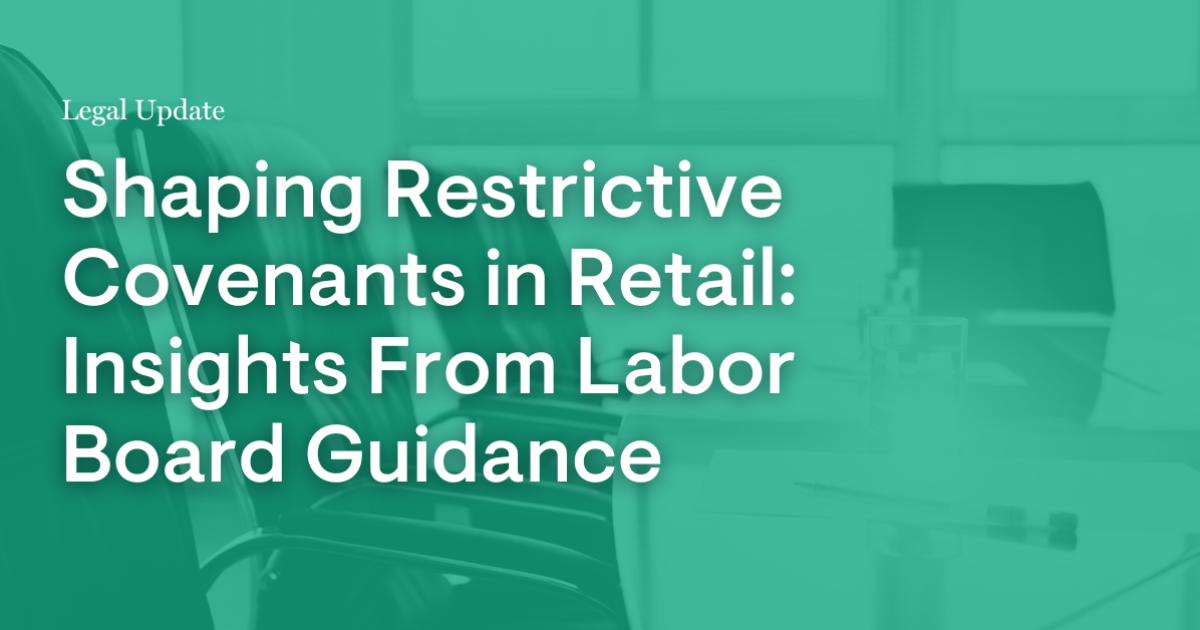
In the evolving retail landscape, where competition is fierce and intellectual property is paramount, the use of restrictive covenants has long been a cornerstone for protecting proprietary information and safeguarding competitive advantages. In May 2023, the general counsel for the National Labor Relations Board (NLRB) issued a memorandum stating non-competes generally violate the National Labor Relations Act, except under rare circumstances. This came after the Federal Trade Commission announced a Notice of Proposed Rulemaking that would ban non-competes in employment agreements.
In December 2023, the NLRBâs Division of Advice issued a memorandum on non-competes that may suggest that the NLRBâs position is not as sweeping as first presented. Below are highlights from the memo that may affect how retailers approach the drafting of these agreements:
1. Non-Solicitation of Customers Are Generally Lawful, So Long As the Customer Pool Is Not Limited: The Division evaluated a provision titled âNon-compete Agreementâ that defined ânot competeâ to mean âthe Employee shall not ⦠solicit or seek the business of any customer [] of the Company â¦.â The Division found this provision lawful because it defined ânot competeâ in a way that does not prevent an employee from obtaining new employment, including employment with a competitor. The Division found the restriction on soliciting the companyâs customers did not âdeny them the ability to quit or change jobsâ absent a showing of âsuch a limited pool of customers in the industryâ that the provision would have effectively foreclosed any future employment opportunities.
2. Confidentiality Provisions Are Generally Lawful, So Long As They Do Not Prohibit Disclosure of Employee Information: The Division evaluated a non-disclosure provision that prohibited the employee from disclosing or using âany information related to the Employerâs business and the business of the Employerâs present or prospective customers, including, but not limited to, any promotional concepts, marketing plans, strategies, drawings, customer lists or other information not otherwise made available to the general public.â The Division found this provision was lawful as it applied only âto information about the Employerâs businessâ and provided examples of âthings that are clearly proprietary and trade secrets.â Significantly, the Division noted the provision did not reference any employee information, such as âwage information or anything else relating to terms and conditions on employment.â Provisions that purport to prevent employees from disclosing such information would violate the NLRA.
3. Return of Property Provisions Are Lawful: The Division also evaluated a provision that required the return of all Employer property and found it to be lawful. Thankfully, not much analysis was needed here.
4. Best Interest Restrictions May Be Unlawful: The Division found a provision that required the employee to âdevote her full time to the conduct of the business of the Employer and shall not directly or indirectly, during the term of this AGREEMENT engage in any activity competitive with or adverse to the Corporationâs business or welfare whether alone, or as a partner, officer, director, Employee, advisor, agent or investor of any other ⦠entity or personâ was unlawful, however. The Division noted the provision had the âtendency to chill employees in the exercise of their Section 7 rights.â The Division found the provision could be read to: (1) prevent employees from joining a union as it may be âadverseâ to the company; and (2) broadly prevent outside employment, which would prevent an employee from working as a âpaid union saltâ (a union organizer who accepts a job intending to organize other employees). The Division did not specifically address the tension between its finding and the common law duty of loyalty. The Division noted, however, the employerâs âinterest of ensuring full-time salaried employees devote their working time to the Employer while the Employer is contractually obligated to pay them does not rebut the presumption that this rule has a reasonable tendency to chill Section 7 activity.â If a company wants to include a âbest interestâ provision, then it should consider using narrower language (e.g., eliminate a broad prohibition on activity that is âadverseâ to the company), and limit the restriction on outside employment to work with competitive businesses.
Retailers must ensure restrictive covenant agreements are narrowly tailored to protect proprietary information, trade secrets, and customer relationships, without unnecessarily infringing on employeesâ rights and ability to access employment opportunities. Retailers may also want to explore alternative strategies for protecting proprietary information, such as implementing robust cybersecurity measures, incentivizing employee loyalty through non-restrictive means, and fostering a culture of trust and collaboration.
Retailers should review their existing restrictive covenant practices to assess the language, scope, and potential impact of such agreements on employeesâ rights. The goal should be to foster a fair and respectful workplace environment while safeguarding employeesâ competitive edge in an increasingly competitive landscape.
Please contact a Jackson Lewis attorney with any questions.

Source link












